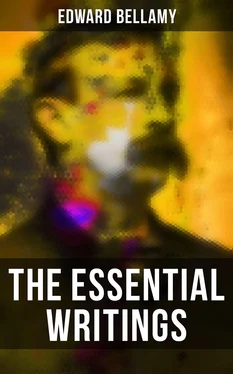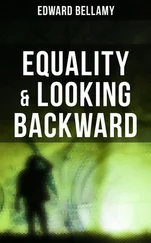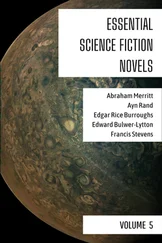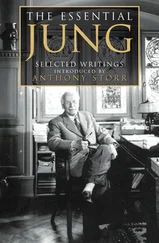"Regarded as necessary steps in the evolution of society from pure monarchy to pure democracy, these republics of the negative phase mark a stage of progress; but if regarded as finalities they were a type far less admirable on the whole than decent monarchies. In respect especially to their susceptibility to corruption and plutocratic subversion they were the worst kind of government possible. The nineteenth century, during which this crop of pseudo-democracies ripened for the sickle of the great Revolution, seems to the modern view nothing but a dreary interregnum of nondescript, _faineant_ government intervening between the decadence of virile monarchy in the eighteenth century and the rise of positive democracy in the twentieth. The period may be compared to that of the minority of a king, during which the royal power is abused by wicked stewards. The people had been proclaimed as sovereign, but they had not yet assumed the sceptre."
"And yet," said I, "during the latter part of the nineteenth century, when, as you say, the world had not yet seen a single specimen of popular government, our wise men were telling us that the democratic system had been fully tested and was ready to be judged on its results. Not a few of them, indeed, went so far as to say that the democratic experiment had proved a failure when, in point of fact, it seems that no experiment in democracy, properly understood, had as yet ever been so much as attempted."
The doctor shrugged his shoulders.
"It is a very sympathetic task," he said, "to explain the slowness of the masses in feeling their way to a comprehension of all that the democratic idea meant for them, but it is one equally difficult and thankless to account for the blank failure of the philosophers, historians, and statesmen of your day to arrive at an intelligent estimate of the logical content of democracy and to forecast its outcome. Surely the very smallness of the practical results thus far achieved by the democratic movement as compared with the magnitude of its proposition and the forces behind it ought to have suggested to them that its evolution was yet but in the first stage. How could intelligent men delude themselves with the notion that the most portentous and revolutionary idea of all time had exhausted its influence and fulfilled its mission in changing the title of the executive of a nation from king to President, and the name of the national Legislature from Parliament to Congress? If your pedagogues, college professors and presidents, and others who were responsible for your education, had been worth their salt, you would have found nothing in the present order of economic equality that would in the least have surprised you. You would have said at once that it was just what you had been taught must necessarily be the next phase in the inevitable evolution of the democratic idea."
Edith beckoned from the door and we rose from our seat.
"The revolutionary party in the great Revolution," said the doctor, as we sauntered toward the house, "carried on the work of agitation and propaganda under various names more or less grotesque and ill-fitting as political party names were apt to be, but the one word democracy, with its various equivalents and derivatives, more accurately and completely expressed, explained, and justified their method, reason, and purpose than a library of books could do. The American people fancied that they had set up a popular government when they separated from England, but they were deluded. In conquering the political power formerly exercised by the king, the people had but taken the outworks of the fortress of tyranny. The economic system which was the citadel and commanded every part of the social structure remained in possession of private and irresponsible rulers, and so long as it was so held, the possession of the outworks was of no use to the people, and only retained by the sufferance of the garrison of the citadel. The Revolution came when the people saw that they must either take the citadel or evacuate the outworks. They must either complete the work of establishing popular government which had been barely begun by their fathers, or abandon all that their fathers had accomplished."
Chapter III.
I acquire a stake in the country
Table of Contents
On going into breakfast the ladies met us with a highly interesting piece of intelligence which they had found in the morning's news. It was, in fact, nothing less than an announcement of action taken by the United States Congress in relation to myself. A resolution had, it appeared, been unanimously passed which, after reciting the facts of my extraordinary return to life, proceeded to clear up any conceivable question that might arise as to my legal status by declaring me an American citizen in full standing and entitled to all a citizen's rights and immunities, but at the same time a guest of the nation, and as such free of the duties and services incumbent upon citizens in general except as I might choose to assume them.
Secluded as I had been hitherto in the Leete household, this was almost the first intimation I had the public in my case. That interest, I was now informed, had passed beyond my personality and was already producing a general revival of the study of nineteenth-century literature and politics, and especially of the history and philosophy of the transition period, when the old order passed into the new.
"The fact is," said the doctor, "the nation has only discharged a debt of gratitude in making you its guest, for you have already done more for our educational interests by promoting historical study than a regiment of instructors could achieve in a lifetime."
Recurring to the topic of the congressional resolution, the doctor said that, in his opinion, it was superfluous, for though I had certainly slept on my rights as a citizen rather an extraordinary length of time, there was no ground on which I could be argued to have forfeited any of them. However that might be, seeing the resolution left no doubt as to my status, he suggested that the first thing we did after breakfast should be to go down to the National Bank and open my citizen's account.
"Of course," I said, as we left the house, "I am glad to be relieved of the necessity of being a pensioner on you any longer, but I confess I feel a little cheap about accepting as a gift this generous provision of the nation."
"My dear Julian," replied the doctor, "it is sometimes a little difficult for me to quite get your point of view of our institutions."
"I should think it ought to be easy enough in this case. I feel as if I were an object of public charity."
"Ah!" said the doctor, "you feel that the nation has done you a favor, laid you under an obligation. You must excuse my obtuseness, but the fact is we look at this matter of the economic provision for citizens from an entirely different standpoint. It seems to us that in claiming and accepting your citizen's maintenance you perform a civic duty, whereby you put the nation--that is, the general body of your fellow-citizens--under rather more obligation than you incur."
I turned to see if the doctor were not jesting, but he was evidently quite serious.
"I ought by this time to be used to finding that everything goes by contraries in these days," I said, "but really, by what inversion of common sense, as it was understood in the nineteenth century, do you make out that by accepting a pecuniary provision from the nation I oblige it more than it obliges me?"
"I think it will be easy to make you see that," replied the doctor, "without requiring you to do any violence to the methods of reasoning to which your contemporaries were accustomed. You used to have, I believe, a system of gratuitous public education maintained by the state."
"Yes."
"What was the idea of it?"
Читать дальше












